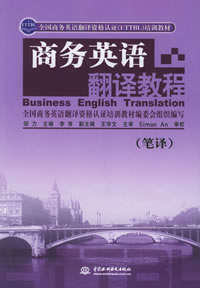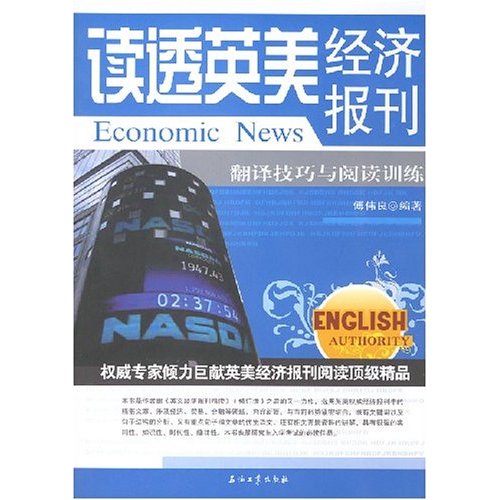Getting Started as a Translator:Gleanings from Honyaku (第四部分)
作者:古龙 2009-07-04




语际翻译公司 转载请注明https://www.scientrans.com
∗本栏目部分文章内容来自互联网,部分已经过本站编辑和整理,如有版权事宜请联系Email/MSN jesczhao@hotmail.com
Fred Uleman
________________________________________
Start now, at the bottom of an economic cycle. By the time it eventually hits a peak (don't even ask at what level that will be) you will be experienced enough to take care of yourself when budgets are cut.
Breaking into the market as a freelance translator may be difficult, so try the old strategy of starting off working in-house somewhere to develop skills. If you can pick up a little work on the side, without a conflict of interest, that is OK.
Develop superior skills in the target language. Do this by deliberate study and careful reading, books on rhetoric, for example. Expand your vocabulary so you don't fall into the amateurish trap of falling back on the first word in Nelson's and letting it go because it somehow fits (e.g., sekkyokuteki ---> aggressive, eager).
For much work, you don't have to be an expert in the target field, but you have to be able to understand what the experts are writing.
Develop an understanding for social limitations to the quality of the original Japanese that you are given. I used to refer to a translation company I ran for a few years as the Silk Purse Manufacturing Co.
Buy books and get magazines in your target field and output language, if you can afford them. Second-hand is good enough sometimes. College textbooks in your field are good to have. They will give information in context; scanning (not necessarily studying) them will position you to undertstand material. Develop a feeling for how people who are native English speakers/writers (or a reasonable equivalent) write for native English speakers (with support of style books, editors, etc.) in your field.
If you become highly specialized, consider joining professional organizations in that field.
Learn how to appraise client needs, client perceptions of the original, the work required, and the desired output. Put effort into developing client relationships for two-way benefits. Know when to decline a job offer because (you need not say it to anyone) it is too tough. Know when to accept a job that is too tough to give you a profit (= decent return on your time) because it is important for relationship-building.
I would add that it pays to subscribe to a few magazines in one's special field and target language, to stay familiar with what is going on. For experienced translators, skimming this kind of material is enough to get a feeling for the terminology, usage patterns, etc.
Scavenge the used book dealers for basic references even if out of date. For one, you may get some older material to translate, and, further, it is usually simple to judge if content is dated. Sometimes older books have better explanations than newer ones. The best basic reference on statistics that I have is from the 1940s.
Work hard always at CRM (Client Relationship Management) so that when there are problems in the original you can explain them and get a go-ahead for judgmental treatment, or clarification, as well as acccess to information.
Learn to subsist on low income for a number of years. Wear hand-me-down clothing. You only need one suit, one shirt and one tie to visit clients.
Avoid my own field.
Aaron M Cohen
________________________________________
From November 2003, in reply to a question from a student of Japanese:
________________________________________
You might want to read the information provided in the following publications:
Morry Sofer, The Translator's Handbook, Schreiber Publishing (4th Revised Edition, 2002)
John Glenn, Glenn's Guide to Translation Agencies (no longer in print, but perhaps available online or from other translators)
These books will explain the ABCs of getting into the industry, securing work as a freelancer, and so on.
One thing that has come up here in past discussions of entering the industry, and that is probably the most important point to emphasize to you: Knowing Japanese or any other foreign language well is not enough. You will need to develop extensive knowledge of a technical field or two if you hope to make a living as a professional translator. Specialties vary across a wide range, and include fields like chemistry, pharmaceuticals, finance, engineering, telecommunications and so on, but it is important that you develop a grounding in at least one of these fields. One good way to do so is to work for a time for a Japanese company as an in-house translator so that you can develop some expertise and hone your skills.
- 评论
- seme:文章内容文章内容文章内容文章内容文章内容文章内容文章内容文章内容文章内容 章内容文章内容文章内容文章内容文章内容
- seme:文章内容文章内容文章内容文章内容文章内容文章内容文章内容文章内容文章内容 章内容文章内容文章内容文章内容文章内容

- 谈翻译观念的嬗变与翻译技能的训练
2009-6-15 15:33:10 - 《高等学校英语专业英语教学大纲》中规定,大学生通过四年的在校学习,“能运用翻译的理论和技巧,将英美报刊上的文章以及文学原著译成汉语,或将我国报刊、杂志上的文章和一般文学作品译成英语……。译文要求忠实...
- 翻译与网络营销
2009-6-11 0:02:31 - Translation and Your International E-Commerce Strategy Most businesses realize that they ...
- 第四届IEEE生物信息与生…
2009-6-30 19:42:01 - 基本信息 主办单位: 四川大学,IEEE生物医学工程协会(EMBS) 承办单位 开始日期 2010/06/18 结束日期 截稿日期 2009/1...
- 第九届全国光电技术学术…
2009-6-30 19:35:58 - 基本信息主办单位: 中国宇航学会光电技术专业委员会承办单位 开始日期 2009/11/01结束日期 截稿日期 2009...
















